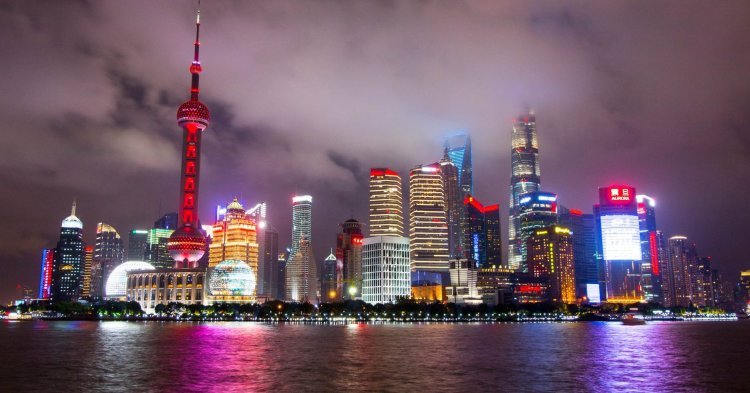In the past few years, China’s rise has shifted from the advent of a new economic powerhouse to a challenge of the liberal global order. China tries to dominate trade in Eurasia through the Belt and Road Initiative, to steer technological trends through “Made in China 2025” and “China Standards 2035” and to partly replace global economic institutions through initiatives like the Asian Infrastructure Investment Bank and the Shanghai Cooperation Organization. China also also attempts to censor criticism of the communist government around the world by leveraging its economic might. There are diverging opinions on whether China actively tries to rule the world or just wants to get rid of a liberal world order that constrains it, but the effect might be similar : a world in which it is difficult to escape China’s influence or to do anything that it views as a threat to its interests.
In this piece, I argue that the West must not let China establish global dominance and that Europe has to bear a great deal of the burden doing so. China’s autocratic regime not only censors its press and puts its opposition and some ethnic minorities into concentration camps, but is also building up the most comprehensive system of social control the world has ever seen. Its Social Credit Score is founded upon constant surveillance of everyone. Taking part in demonstrations, jaywalking or being estranged from one’s parents can lead to rights and benefits being withheld, from university admittances and career opportunities to the use of public transport. The Chinese government is already extending the system to foreign businesses active in China. A criticism of the Chinese government by a European employee on a social network can lead to sanctions towards that company in China. This enables China to stifle democratic debates not only within its borders, but globally.
A New Cold War…
China’s ascendancy and its threat to the democratic world can be compared to the role the Soviet Union played during the Cold War. China lacks the ring of satellite states the Soviet Union had and its military might is a far cry from the Red Army. Its only real allies are Pakistan and North Korea. Still, China’s future technological and economic dominance and the sheer size of its population make it a stronger adversary for the democratic world than the Soviet Union ever was.
The democratic world itself has changed quite a bit. The United States is still the dominant power and its share of global GDP has remained roughly the same in the past forty years and its military is unrivalled. By raw data, the US, if anything, is more equipped to deal with a contender than it was during the Cold War. It has also recognised the challenge posed by China. Donald Trump’s trade war against it might not hamper China’s growth for long, but could isolate it on the global stage and starve it of access to technology and capital for some time. Unfortunately, Donald Trump is at the same time weakening the West vis-à-vis China.
…and a Very Different America
During the Cold War, the United States embraced science and innovation, profited from open discourse and showed a remarkable institutional adaptability to change. Amid right-wing disdain for the concept of truth, widespread distrust of the press and increasing political polarization have weakened American public discourse and given legitimacy to Chinese-style propaganda. Donald Trump has also severely damaged American institutions, making the United States less adaptable and less effective. If the foremost power of the democratic world becomes ineffective and unfree, liberty is in danger around the globe.
Despite its global dominance, the United States did not win the Cold War on its own, either. It was successful because it was able to leverage the power resources of the entire democratic world as well as of many dictatorships. Its allies, especially the European Community and Japan, not only hosted American troops, but also supported the American-dominated world order through their economic might. Today, pitted against a far richer challenger than the Soviet Union was, America needs these allies more than ever. Unfortunately, Donald Trump is doing everything he can to break up the democratic world as a geopolitical unit. His trade war against Europe, his lack of commitment to NATO, his refusal to join the Trans-Pacific Partnership make it easy for China to divide and rule. The United States is weakening itself while trying to take on China on its own. It is destined to fail.
Europe’s Responsibility
With the United States weakened and not reliably committed to either freedom or its allies, somebody else has to defend liberty around the world. As Japan is too small, only Europe can take on this challenge. In order to succeed, Europe must strengthen itself as well as change its attitude towards China and towards its allies.
First, Europe, i.e. its political manifestation, the European Union, must improve its institutions. It must embrace majority voting and a stronger Commission and Parliament to achieve greater unity and effectiveness. It cannot allow its member states being bribed or blackmailed by China to do its bidding. China cannot seduce the entire European Union, so giving more responsibility to common institutions is bound to make Europe more resilient towards Chinese advances. In addition to trade policy, foreign policy must be fully vested in the European Union. The twenty-seven militaries must be integrated into a European army that can project power globally. Yes, European integration is about peace, but if we want it to also be about freedom, we must be ready to be a global military power.
Second, Europe must strengthen its economy. While the United States’ share of world GDP has remained relatively unchanged, China’s gains have mostly been at the expense of Europe and Japan. We must strengthen the Euro by implementing common economic policies and establishing transfers not between rich and poor countries, but between rich and poor regions and taxpayers. This will not only spare us costly crises and strengthen trust and therefore growth, but also help to make the Euro a more dominant global reserve currency, giving us trade benefits and the ability to export inflation. The European Union also must strengthen its science and innovation by investing huge sums into research and development. Technological leaders can reap great profits and we should be the ones reaping them. Europe also must strengthen its demographic position and human capital. We need massive programmes for skilled immigration, importing millions of people. Our internationalisation should be supported by the widespread adoption of English in our education systems and administrations.
Europe must also change its international policy. We must support Donald Trump’s trade war against China. We cannot allow China to discriminate against our companies on its domestic market or to buy out technology in Europe. We must isolate it in global economic institutions and sanction it when it violates our political interests. We must support the Chinese opposition and recognise Taiwan as an independent country.
At the same time, Europe must try to bring back together the democratic world. It must strengthen trade ties and military cooperation, especially with those nations most threatened by China’s ascendancy such as South Korea, Japan, Taiwan, India and Australia. It must offer alternatives to Chinese investments in developing countries. The relationship with the United States should be cooperative, but not submissive. Yes, we should have a free trade area, and no, we should not tolerate an American trade war against us. Neither should we tolerate American spying. Donald Trump was right when calling us out on our lack of commitment in NATO, but if we shoulder more burdens, we will also take more responsibility and agency in return.
The free world is needed now more than ever. The United States is failing to lead it on its own. The European Union has to step in.


Suivre les commentaires : |
|
